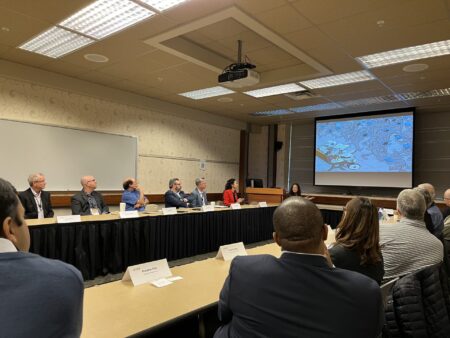Industry roundtable sparks collaboration across four Purdue colleges to explore AI and well-being
Written By: Rebecca Hoffa, rhoffa@purdue.edu

A woman stands in a dimly lit living room and begins addressing a roomful of industry professionals and Purdue faculty with expertise spanning hospitality and tourism management, industrial engineering, computer graphics technology, theater and more.
“We hope that your time here will be enriching, inspiring and filled with opportunities to learn from esteemed speakers, engage in thought-provoking conversations, and forge new connections that will shape the future of hospitality,” the woman says.
When she finishes her speech, Ron Martin, principal projection and effects engineer at AOA — a company that specializes in themed entertainment and experiences for companies such as Walt Disney World — closes the window on the screen, the pixels shifting into a PowerPoint presentation. The AI-generated woman was merely a character delivering a welcome message for the Oct. 20 roundtable discussion focused on the coexistence of AI advancements and human well-being, pulling the information from Martin’s calendar.

Faculty and industry professionals gather for the “Human Flourishing in the AI Era” roundtable on Oct. 20.(Photo by Rebecca Hoffa)
Titled “Human Flourishing in the AI Era,” the roundtable was part of the White Lodging-J.W. Marriott, Jr. School of Hospitality and Tourism Management’s (HTM) Spirit of Hospitality Summit and spanned two hours of rich dialogue. The session gathered Purdue University faculty from the colleges of Health and Human Sciences, Engineering and Liberal Arts as well as the Polytechnic Institute to collaborate on innovative solutions related to AI and experience design.
The roundtable also blended the scholarly perspectives with the distinct viewpoints of industry professionals from a variety of businesses and organizations, including the City of Lafayette, Visit Indy, Lais Hotel Properties Limited, and Purdue’s own Union Club Hotel.
The guided discussion focused on collaborative research and the application of AI in enhancing the social and creative aspects of human experiences in hospitality, leisure and entertainment. As ideas were proposed for exceptional amenities in air travel and reimagined hotels, the minds in the room brainstormed ways to balance high-tech innovation while keeping human creativity and socialization at the center of the activities.
“When we talk about experience design for the collective, we really need to be super, super conscious that our vision doesn’t get ahead of our humanity or leave it behind in a tragic way,” Martin said at the roundtable.
The session was co-developed by Xinran Lehto, professor of hospitality and tourism management, and Mark Lehto, professor of industrial engineering. The two professors served as moderators in the discussion and pulled together a series of images and examples to get people thinking. Many participants noted the siloed, isolated visions of humans flourishing that were produced by AI and expressed their shared drive to maintain the social, human side of experiences as technological advancements and AI become increasingly prevalent across the hospitality, leisure and entertainment industries.
With the arrival of generative AI software, such as ChatGPT, Xinran Lehto noted AI has created new possibilities in experience design. In brainstorming the opportunities and pitfalls, she and Mark Lehto began developing ideas for increased research collaboration in experience design and engineering with a focus on human well-being.
“We — HTM, in particular — really need to engage with the engineering side of intellectual power on Purdue’s campus; (engineers) are the people who make it happen,” Xinran Lehto said. “This roundtable is an example of the desire to engage in a larger conversation in the AI era about human experience and human existence.”
Reflecting on the roundtable, Shimon Nof, a professor in the School of Industrial Engineering, explained as artificial intelligence becomes “smarter,” there is an increased fear toward it among humans, due to the lack of familiarity with the technology. Nof said as people become more familiar with these tools in hospitality and related fields, the focus will be preparing the workforce to implement AI and automation in more compassionate ways that are sensitive to client needs.
“The opportunity is great because the use of technology of this kind is exciting, and because it is exciting, it’s an opportunity to look forward,” Nof said. “We should identify the companies already thinking about the visionary hotel in space, but we can do the same for simpler automation that already exists and find the golden path forward.”
For Rich Dionne, chair and associate professor of practice in the Purdue Department of Theatre, the roundtable gave him a new perspective of AI and wellness and the fine line between using AI to improve the design process in entertainment and leisure while not sacrificing human creativity, reinforcing the importance of engaging in these conversations.
“As hotels, restaurants and other hospitality industry areas try to become more immersive and interactive and as the entertainment industries become immersive and interactive, we’re converging somewhere in the future,” Dionne said. “I have a keen interest in trying to propel our department toward what is a reality in the industry, so the chance to have that conversation was interesting. Any chance to get together with a bunch of really smart people and talk about what AI means, I think we should all take advantage of it. We have to — it’s happening right now.”
The roundtable is the first of many events planned to foster collaboration throughout Purdue on the topic of AI and well-being while also closing the gap between research and industry. The Lehtos ended the roundtable with a proposition for future collaborative research and engagement endeavors.
“AI technology can be very powerful,” Xinran Lehto said. “If we design it well, it can really enrich everyone’s life. The starting point should be about human wellbeing and human flourishing.”
Purdue’s White Lodging-J.W. Marriott, Jr. School of Hospitality and Tourism Management offers four undergraduate majors and three graduate programs, including the top-ranked online MS in Hospitality Management and Tourism program.
Discover more from News | College of Health and Human Sciences
Subscribe to get the latest posts sent to your email.